|
“Every child should have the opportunity to succeed regardless of their background, challenge or need.” This was the second session in the SWIFT ECF Extra series led by Professor Sonia Blandford and Wendy Casson MBE with the objective of exploring the meaning of inclusion in educational policy and practice with practical strategies to develop inclusion in classrooms. Wendy has experience of working with the “forgotten child” in her previous role as the Head of a PRU where she learned about barriers to learning and Sonia teaches Music every Friday where she practises inclusion across her teaching groups. The following provides a summary of their views and insights on the theme of inclusion. As teachers, it is important always to have high expectations of all children. Part of this is positive relationships across all the dynamics between pupils, parents and teachers in order to get the connection to help them move forward. Be curious. Think as a teacher, is there something I could do differently? Why is the pupil struggling? Are they distracted? Have they got other issues? Consider a trauma-informed approach. What could you do to support them? Children learn differently. Look at other practice near and next to you. Consider external factors out of your control: lesson disruptions, what happened last night, family dynamics, the previous lesson, significantly, the weather and the child’s health that particular day. In practice, “inclusion is the action or state of including or being included within a group or structure. In a school or education setting, it means that every child and every adult who works or learns in a school is valued and whose personal needs are being met.” The four stages of inclusion are:
Inclusion fosters a sense of belonging for everyone - both pupils and teachers. Good schools who deliver inclusive practice value every member of the school community and help parents and carers to be the best parent they can be. Sometimes we kick against being led. But when led effectively, it brings belonging and purpose. Make time to talk and listen to colleagues and to share knowledge and practice. The inclusive classroom should not teach to satisfy Ofsted or to meet the Teacher’s Standards, but teach to meet the needs of the pupils. Allow the pupils to guide you. Keep reinventing yourself, push to do different things. When a lesson does not go well reflect on the effectiveness of your lessons and approaches to teaching and try something different. Embrace the trips and slips! In this fourth industrial (digital) revolution we do not know what the future holds in terms of climate change, and the economy; so it is important to think about an alternative approach and achievable goals for schools. System leadership should work across the Year Group, Key Stage and/or whole school as a shared vision and a commitment to each other for collaboration and improved communication with school leaders and teachers. Consider the foundations of:
Meritocracy has been around for 45 years and has been shown not to work on the premise that those that can will succeed and those who cannot fail. This is not where we want to be in education and we must foster values that include everyone. All children and young people should feel part of what is happening in school. Regrettably, the National Curriculum does not always support inclusion with its one size fits all approach. SEN and disability should not be a barrier to inclusion. Sonia noted that over the last 20 years, educators and parents have all become more aware, but have attached too many labels to too many children. Whereas, we should be more inclusive and integrate children despite their background, challenge or needs. Similarly, Multi-agency teams: SENDCO, SLCN, Ed Psych, CAMHS, Mental Health Practitioners, Social Care and Looked After Teams need to work together more effectively as they are rarely effective Currently, Sonia and Wendy are contributing to research led by Monash University in Australia to consider the approach to inclusion. Results from the student questionnaire found that 44% of students were satisfied to some extent, revealing that they did not feel included and were not happy in school, feeling teachers were not interested in them, they did not have a friend and did not have an advocate for them. Ultimately, they did not have a sense of belonging. The research found that teachers and Leaders listed the following barriers that currently hinder inclusion in their classroom:
Teachers can however take the following steps to support inclusion:
Know the child you teach. Children feel cared for when teachers know their name and know things about them. Know your students’ strengths and areas for development (do not say weaknesses!) and find the balance. Remember to confront without confrontation. Take the problem away, for example, children who arrive in school without a pen to write with. Some of whom are ready to battle with the teacher and waste time in the lesson. Simply, provide a pen for them (and be ready for the serial offenders) so that there is no challenge and disruption to the lesson. The child might not know why they have barriers to learning and it is often the child who needs to belong who does not belong.
Seek to understand their emotional wellbeing. It is often the things that you do not see that can make the difference. But remember the high-performing child. They might be good in your lesson. But stretch them further with targeted work. To conclude, successful inclusion has a shared vision as a core set of values and beliefs shared by all staff, with a commitment to creating an ethos and culture of achievement across the whole school with positive collaboration with parents, children and young people and others within and beyond the school, including other schools, in order to develop and share best practice. Good communication throughout this process encourages modelling positive engagement with all stakeholders. We thank Sonia and Wendy for this uplifting can-do presentation on Inclusive Practice in all Classrooms that makes sense in order to support positive outcomes for all children and young people. The final session in this three-part series takes place online on Thursday 6 July 2023 at 1600 and will focus on Parent and Carer Engagement to Improve Student Outcomes (register on the link below). Report by Jude Owens, PA to the SWIFT Executive Team
0 Comments
Your comment will be posted after it is approved.
Leave a Reply. |
SWIFT News
|
SPONSORED BY
Join us, be a part of our SWIFT community |
© COPYRIGHT 2022 SOUTH WEST INSTITUTE FOR TEACHING SWIFT. ALL RIGHTS RESERVED | Website by brightblueC
VIEW OUR PRIVACY NOTICES | VIEW OUR COURSE T&CS
VIEW OUR PRIVACY NOTICES | VIEW OUR COURSE T&CS

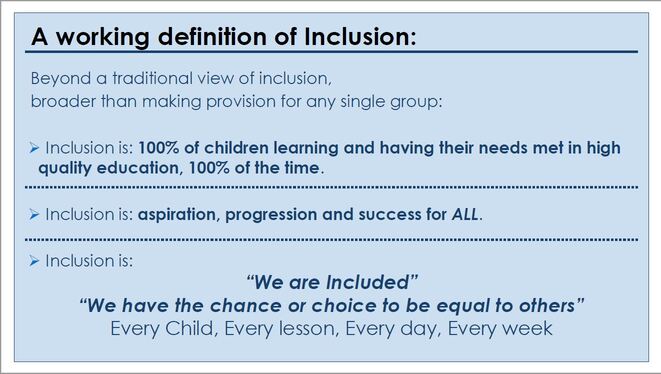
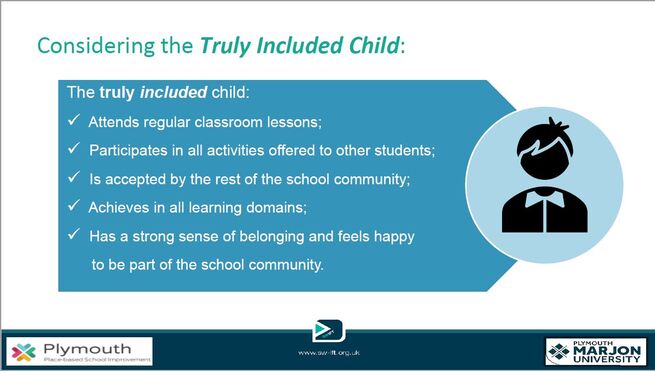
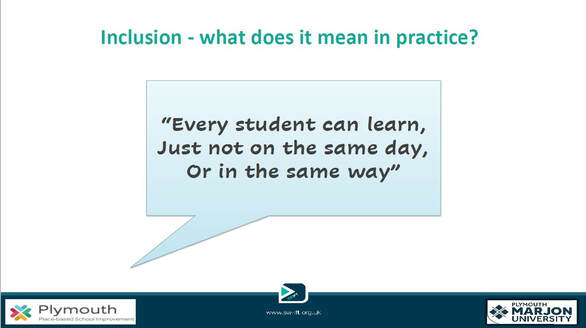
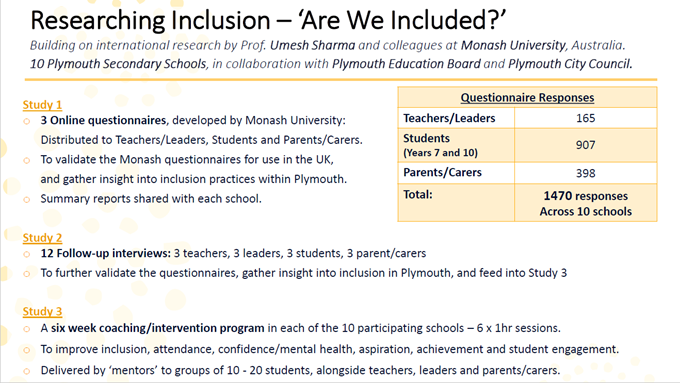
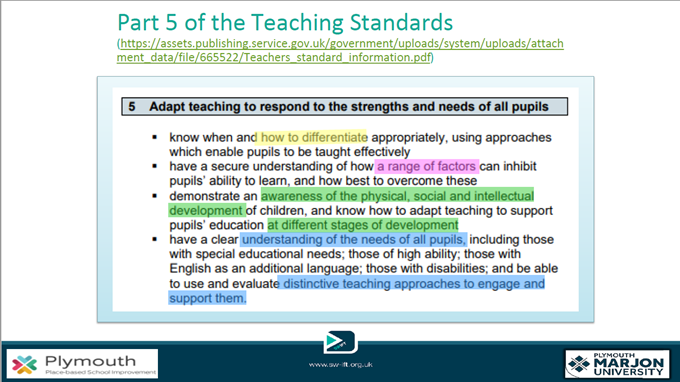
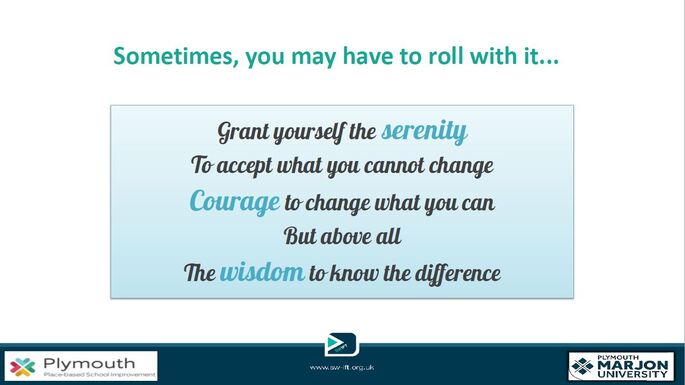
 RSS Feed
RSS Feed





